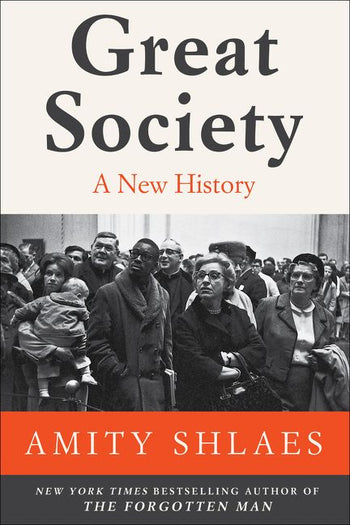Great Society: A New History is enjoyable and enlightening. Selecting stories as ably as she tells them, Amity Shlaes makes sense of the tumultuous 1960s by relating some of its most significant figures’ quests and clashes. Among her accomplishments is the rescuing from obscurity of men who shaped America’s modern political history and discourse, such as the labor leader Walter Reuther, the economist Arthur Burns, and the banker William McChesney Martin.
To fully appreciate Great Society, however, one must read (or re-read) Shlaes’s 2007 bestseller, The Forgotten Man: A New History of the Great Depression. That the books form a two-volume set is appropriate: because Lyndon Johnson was obsessed with Franklin Roosevelt, he shaped the Great Society to resemble, complete, and surpass his hero’s New Deal.
The New Deal was born of an unprecedented economic contraction, the Great Society of an unprecedented expansion. One might suppose, then, that these two domestic policy crusades would end up being very different. Shlaes, however, makes clear that it’s the similarities between the New Deal and the Great Society that are striking and important, and the reason for this continuity is that the same restless ideology—progressivism—animated both.
Specifically, her two books show that progressives’ central principle is that activist government is the only mechanism able to solve a modern society’s problems. The corollary of this commitment to government intervention in the nation’s social and economic life is a belief that objections to such intervention are fundamentally baseless or cynical. There is no legitimate concern, in other words, that plenary government will compromise liberty or democracy. By the same token, there is no serious danger that the economy will be less productive when people must anticipate vigorous but unpredictable government redistribution and regulation than it will be when buyers and sellers of goods and services are concerned only with finding mutually acceptable terms of exchange.
From its origins in the late nineteenth century through to the present day, progressivism has been “an alliance of experts and victims,” in the words of the political scientist Harvey Mansfield. Shlaes helped us understand this alliance by borrowing the title of her previous book from William Graham Sumner, the Yale University social scientist. In 1884, Sumner explored a persistent, troubling social dynamic:
As soon as A observes something which seems to him to be wrong, from which X is suffering, A talks it over with B, and A and B then propose to get a law passed to remedy the evil and help X. Their law always proposes to determine what C shall do for X, or in the better case, what A, B, and C shall do for X.
Sumner’s “Forgotten Man” was C. Worse than forgotten, he was probably never thought of in the first place. “[M]any burdens . . . are laid upon” C, Sumner lamented, in that he is a victim of “the reformer, social speculator and philanthropist.”
